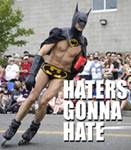Posted on 2012-Jul-16
The argument regarding the legitimacy of self-publishers should have been to put to rest earlier this year when Joe Konrath reported he had made more than $100,000 in a single month. That’s no small chunk of change, and elites in the New York City publishing establishment have taken note of this. However, it was rather bizarre to see a staff writer at the Boston Phoenix giving a condescending opinion on independent authors who choose the self-publishing route:
But let’s ignore, for a moment, a nightmare world in which every talented editor and designer needs to become an independent contractor with no health benefits. What happens to the writer? Would this new system better-serve her? As her own publisher, she’ll need to track down the appropriate professionals to work with her book. Moreover, she’ll need to have the money to pay them. This new model sounds less like egalitarianism and more like the Bush administration, intent on outsourcing government jobs to private contractors. In both publishing models, somebody’s still paying, and in self-publishing, that someone is the author. That doesn’t seem especially meritocratic.

This is an odd argument to make since most large publishing houses outsource a number of services such as editing, cover design, and interior design. The big difference with going the self-publishing route is that the author has a choice of which services to pay for rather than leaving those decisions in the hands of a publishing company. In this way, the independent author is part-artist and part-small businessman. M. Louisa Locke, who writes historical romances as a self-publisher, responds in detail to the Boston Phoenix article as follows:
As with most small businesses, it may take authors who self-publish years to grow their business to the point of making a living, but I am hearing many more stories of authors finding this sort of sustainable income than I ever heard from mid-list authors in traditional publishing. And with more income coming from ebooks, which don’t have the short life span of print books, this income has a much longer impact on an author’s financial security.
So, independent authors must take off their creative caps and put on their business ones when it comes time to planning the sales and marketing of your book. If you do not have a background in business development and accounting, trying to analyze how many sales of your book will net a profit may be a challenging endeavor. To get an idea of what services for authors cost, please have a look at this excellent post from duolit on a full spectrum of services and their costs for the independent writing community.
To get an idea of a simple cost package for a professional eBook (let’s say it’s a romance novel), here are some sample cost breakdowns:
- Editing and Proofreading – $500
- Cover Design – $100
- eBook Design – $60 from BB eBooks
- Marketing on Facebook, Twitter, and Your Own Blog – Free
- Total – $660
Assuming you make all your sales through Amazon’s Kindle Direct Publishing program, they charge a 30% commission on every eBook you sell (if priced at $2.99 or higher). Then of course there are always taxes, and let’s say the IRS takes about 10% of your sales. Assuming you price your Romance novel at $4.99, you would get about $3 per sale for your eBook. That means the break-even point would be selling 220 eBooks. You would only need to sell about 20 a month for one year, and you would recover your investment. That’s not too difficult. Plus, you have the security knowing that you own all rights to your book and you don’t have to deal with agents and publishers.
While there are pros and cons to going either traditional or self-publishing, the fact that you get to be a person with business sense should be a pro in the self-publishing column. Please consult the BB eBooks publishing page for more information on independent publishing.
Label: Self-Publishing
comments powered by Disqus